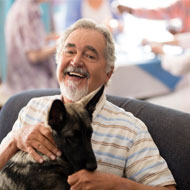Therapy dogs lower blood pressure in the elderly

Therapy dogs could be used to treat or prevent the development of cardiovascular disease in the elderly.
A study by researchers in Sweden has revealed that therapy dogs could be used to treat or prevent the development of cardiovascular disease in the elderly.
The study, published in the journal Anthrozoos, investigated whether repeat visits by a therapy dog to a nursing home might affect the blood pressure and heart rate of its residents.
The investigation involved two consecutive experiments - a dog study (two researchers and a therapy dog) and a control study (two researchers alone). Each group visited three nursing homes over three different periods, during which researchers measured the heart rate and blood pressure of residents at 0 and 20 minutes of each visit.
In the control study, researchers found that the participants’ heart rate and blood pressure did not change significantly. In the dog study, however, researchers found that participants had a much lower blood pressure compared with those in the control.
‘These findings suggest that visits by a therapy dog–handler team might constitute an effective non-medical treatment for elevated blood pressure and heart rate in older adults,’ the authors conclude.
‘This type of treatment may in the future be used to treat, to prevent, or to delay the development of cardiovascular disease in older people. It may also promote health in a more general sense and decrease use of pharmaceutical drugs, which might be associated with undesirable side effects.’
The study was carried out by by the Swedish University of Agricultural Sciences and the University of Skovde, Sweden.



 RCVS Knowledge has welcomed Professor Peter Cockcroft as editor-in-chief for Veterinary Evidence.
RCVS Knowledge has welcomed Professor Peter Cockcroft as editor-in-chief for Veterinary Evidence.